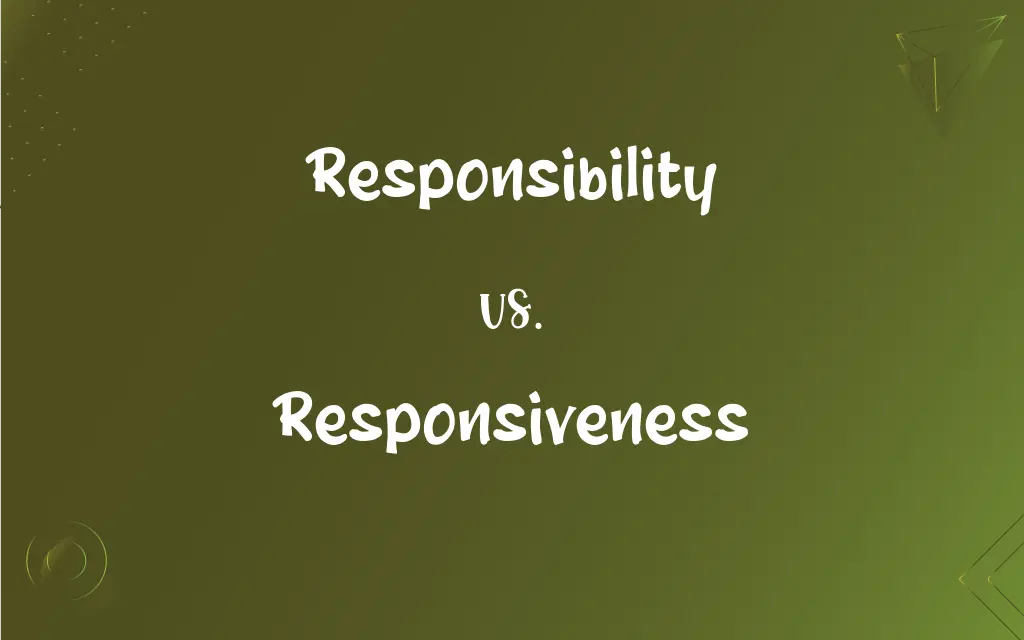Responsibility vs. Responsiveness: What's the Difference?
Edited by Aimie Carlson || By Harlon Moss || Updated on November 6, 2023
Responsibility refers to the duty to deal with something; responsiveness is the quality of reacting quickly and positively.

Key Differences
Responsibility is the state or fact of having a duty to deal with something or of having control over someone. A person's sense of responsibility often drives them to complete tasks they are assigned or to care for individuals they are accountable for. In contrast, responsiveness denotes the ability or willingness to respond to something or someone. The term often describes the speed and effectiveness of a reaction, be it from a person, a system, or an organization.
In a corporate setting, an employee's responsibility might include completing their work on time and adhering to company policies. Meanwhile, the company's responsiveness can be reflected in how quickly and effectively it addresses customer complaints or market changes. While an employee might be responsible for a project, the manner and efficiency with which they address issues during the project showcase their responsiveness.
Responsibility can be assigned or accepted, implying an obligation to perform a task or role. It’s about accountability and the moral or legal obligation to take care of something or someone. On the other hand, responsiveness is indicative of one's ability to react and adapt; it isn't about obligation but about the manner of fulfilling those obligations or the ability to adapt to new challenges or requests.
In the context of a relationship, responsibility could refer to the need to be faithful and supportive, while responsiveness in the same relationship might relate to how quickly and effectively one partner reacts to the other’s emotional needs or communication. A responsible partner may fulfill their duties consistently, but a responsive partner will adapt and react to changes and needs efficiently and empathetically.
Educationally, a student’s responsibility is to learn and complete assignments, whereas the responsiveness of a teacher might refer to how quickly and thoroughly they provide feedback on student work. The student is judged on the fulfillment of responsibilities, but the teacher is often evaluated on the quality and speed of their responsiveness to student needs.
ADVERTISEMENT
Comparison Chart
Definition
Duty to deal with something
Quality of reacting quickly and positively
Nature
Obligatory and ethical
Reactive and adaptive
In Relationships
Fulfilling duties to another person
How one reacts to another’s needs
In Work
Completing assigned tasks
How quickly one addresses and solves problems
In Customer Service
Ensuring customer needs are met
Speed and efficiency in addressing customer inquiries
ADVERTISEMENT
Responsibility and Responsiveness Definitions
Responsibility
Duty or obligation.
He took responsibility for the project's completion.
Responsiveness
Act of replying or reacting.
The company’s responsiveness to customer feedback was commendable.
Responsibility
Accountability.
The CEO accepted responsibility for the company's failure.
Responsiveness
Quick to react or respond.
The responsiveness of emergency services can save lives.
Responsibility
Authority to act.
She has the responsibility to sign off on new hires.
Responsiveness
Responsive quality.
The software’s responsiveness to user input makes it a joy to use.
Responsibility
A particular burden of obligation.
Parents bear the responsibility for their child’s upbringing.
Responsiveness
The ability to recover promptly.
Her responsiveness to treatment was a good sign.
Responsibility
A thing that one is required to do as part of a job, role, or legal obligation.
His responsibilities include managing the budget.
Responsiveness
Being sensitive to the needs of others.
A good teacher's responsiveness to students is crucial for learning.
Responsibility
The state, quality, or fact of being responsible.
Responsiveness
Answering or replying; responding.
Responsibility
A duty or obligation that one is responsible for.
Responsiveness
Readily reacting to suggestions, influences, appeals, or efforts
A responsive student.
FAQs
What characterizes good responsiveness?
Quick, effective, and positive reactions.
Why is responsiveness important in customer service?
It builds trust and satisfaction by addressing needs quickly.
Can responsibility be shared?
Yes, duties can be divided among individuals.
Does responsiveness relate to emotions?
Yes, it includes reacting to others’ emotions appropriately.
What does taking responsibility mean?
Assuming accountability and fulfilling obligations.
What's the difference between legal and moral responsibility?
Legal is bound by law, while moral is guided by personal ethics.
Does technology affect responsiveness?
Yes, it can significantly improve reaction times.
How can a business show responsibility?
By fulfilling its commitments and operating ethically.
Is responsibility inherent or assigned?
It can be both inherent to a role or assigned by others.
Can responsiveness be learned?
Yes, through training and experience.
Is responsibility a value?
It is considered a core ethical value.
How can one improve responsiveness?
Through feedback, practice, and adaptability.
Are responsibility and accountability the same?
Accountability is often the consequence of responsibility.
Can a person be responsible but not responsive?
Yes, one may fulfill duties but not adapt quickly to changes.
Can responsiveness be measured?
Yes, through time taken to react and the quality of the response.
How does responsiveness impact relationships?
It can improve communication and trust.
Does responsibility involve decision-making?
Yes, making decisions is often a key part of one's responsibilities.
Why is taking responsibility important?
It’s key for trust, growth, and legal reasons.
What are the types of responsibilities?
Personal, professional, societal, and legal.
What affects an individual's responsiveness?
Factors include skill, awareness, and willingness.
About Author
Written by
Harlon MossHarlon is a seasoned quality moderator and accomplished content writer for Difference Wiki. An alumnus of the prestigious University of California, he earned his degree in Computer Science. Leveraging his academic background, Harlon brings a meticulous and informed perspective to his work, ensuring content accuracy and excellence.
Edited by
Aimie CarlsonAimie Carlson, holding a master's degree in English literature, is a fervent English language enthusiast. She lends her writing talents to Difference Wiki, a prominent website that specializes in comparisons, offering readers insightful analyses that both captivate and inform.
































































